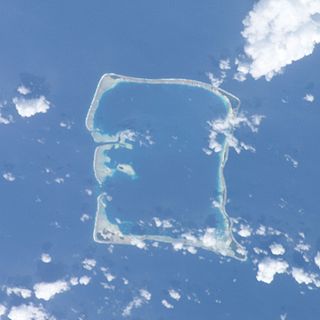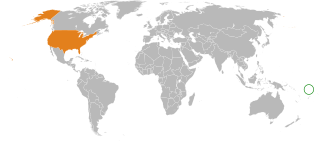
The first inhabitants of Tuvalu were Polynesians, so that the origins of the people of Tuvalu can be traced to the spread of humans out of Southeast Asia, from Taiwan, via Melanesia and across the Pacific islands of Polynesia.

The Gilbert and Ellice Islands were a British protectorate from 1892 and colony from 1916 until 1 January 1976, when the islands were divided into two colonies which became independent nations shortly after. A referendum was held in December 1974 to determine whether the Gilbert Islands and Ellice Islands should each have their own administration. As a consequence of the referendum, the Gilbert and Ellice Islands colony ceased to exist on 1 January 1976 and the separate countries of Kiribati and Tuvalu came into existence.

The Code of Federal Regulations (CFR) is the codification of the general and permanent rules and regulations published in the Federal Register by the executive departments and agencies of the federal government of the United States. The CFR is divided into 50 titles that represent broad areas subject to federal regulation.

The Prime Minister of Tuvalu is the head of government of Tuvalu. According to Tuvalu's constitution, the prime minister must always be a member of the Parliament, and is elected by parliament in a secret ballot. Because there are no political parties in Tuvalu, any member of parliament can be nominated for the role. Following parliament vote the Governor-General of Tuvalu is responsible for swearing the prime minister in.

Nukulaelae is an atoll that is part of the nation of Tuvalu, and has a population of 324 the largest settlement is Pepesala on Fangaua islet with a population of 247 people. It has the form of an oval and consists of at least 15 islets. The inhabited islet is Fangaua, which is 1.5 kilometres (0.93 mi) long and 50 to 200 metres wide. The easternmost point of Tuvalu is Niuoko islet. The Nukulaelae Conservation Area covers the eastern end of the lagoon. A baseline survey of marine life in the conservation zone was conducted in 2010.

Nukufetau is an atoll that is part of the nation of Tuvalu. The atoll was claimed by the US under the Guano Islands Act some time in the 19th century and was ceded in a treaty of friendship concluded in 1979 and coming into force in 1983. It has a population of 536 who live on Savave islet. In 1951 the school that was located on Motumua islet was transferred to Savave and became the government primary school for Nukufetau. It was named the Tutasi Memorial School in honour of its predecessor.

The Intellectual Property Office of the United Kingdom is, since 2 April 2007, the operating name of The Patent Office. It is the official government body responsible for intellectual property rights in the UK and is an executive agency of the Department for Business, Energy and Industrial Strategy (BEIS). Some work on copyright policy is shared with the Department of Culture, Media and Sport and plant breeders' rights are administered by the Plant Variety Rights Office, an agency of the Department for Environment, Food and Rural Affairs.

The Parliament of Tuvalu, or Palamene o Tuvalu is the unicameral national legislature of Tuvalu.
Tuvalu has no army, but its national police force, the Tuvalu Police Force headquartered in Funafuti includes a Maritime Surveillance Unit, Customs, Prisons and Immigration. Police officers wear British style uniforms.

Tuvalu – United States relations are bilateral relations between Tuvalu and the United States.

The monarchy of Tuvalu is a system of government in which a hereditary monarch is the sovereign and head of state of Tuvalu. The present monarch of Tuvalu is Queen Elizabeth II, who is also the Sovereign of 15 other Commonwealth realms. The Queen's constitutional roles are mostly delegated to the Governor-General of Tuvalu.

Funafuti is an atoll and the capital of the island nation of Tuvalu. It has a population of 6,025 people, making it the country's most populated atoll, with 56.6 percent of Tuvalu's population. It is a narrow sweep of land between 20 and 400 metres wide, encircling a large lagoon 18 km long and 14 km wide. The average depth in the Funafuti lagoon is about 20 fathoms. With a surface of 275 square kilometres (106.2 sq mi), it is by far the largest lagoon in Tuvalu. The land area of the 33 islets aggregates to 2.4 square kilometres (0.9 sq mi), less than one percent of the total area of the atoll. Cargo ships can enter Funafuti's lagoon and dock at the port facilities on Fongafale.

The Tuvaluan Passport is an international travel document that is issued to Tuvaluan citizens.

The Cabinet of Tuvalu is the executive branch of the government of Tuvalu.

This is a survey of the postage stamps and postal history of Tuvalu.

The Tuvalu Philatelic Bureau is the government body in Tuvalu that issues new stamps and first day covers, which are purchased by stamp collectors around the world. The Tuvalu Philatelic Bureau is located in Funafuti.

The Law of Tuvalu comprises the legislation voted into law by the Parliament of Tuvalu and statutory instruments that become law; certain Acts passed by the Parliament of the United Kingdom ; the common law; and customary law. The land tenure system is largely based on kaitasi.

Crime in Tuvalu is not a significant social problem due to an effective criminal justice system and also due to the influence of the social institutions of Tuvalu, which include the Falekaupule and the central role of religious institutions in the Tuvaluan community. The Falekaupule continues to play an important role in Tuvaluan society, as the islands of Tuvalu have small communities living in villages. The largest community is on Funafuti atoll, the capital of Tuvalu, with 4,492 residents in the 2002 census.











